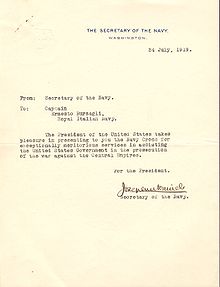Josephus Daniels
After the Mexican Revolution, as ambassador to Mexico, Daniels dealt with the anti-American government and its expropriation of American oil investments.
Josephus Daniels was born in 1862 to a shipbuilder and his wife in Washington, North Carolina, located on the Pamlico River in Beaufort County.
Jonathan followed his father into public service, serving as a special assistant and, briefly, White House Press Secretary to President Franklin D. Roosevelt in the 1940s.
In 1894, with the financial assistance of industrialist Julian S. Carr,[3] also a white supremacist, Daniels acquired a controlling interest in Raleigh's News & Observer, and left his federal position.
Under his leadership, the paper was a strong advocate for the Democratic Party, which at the time was struggling to maintain its power in the state against a fusion of the Republicans and Populists.
[6] According to Daniels in his autobiography, "The News & Observer was relied upon to carry the Democratic message and to be the militant voice of White Supremacy, and it did not fail in what was expected.
"[2] Daniels printed numerous articles intended to stoke fears of black men as rapists of white women.
A lone white woman noticing a black man in her vicinity would be written up in the paper as a narrowly avoided rape.
Daniels also argued that achieving political office emboldened black men to commit more outrages against white women.
[7] According to historian Helen Edmonds, the paper "led in a campaign of prejudice, bitterness, vilification, misrepresentation, and exaggeration to influence the emotions of the whites against the Negro.
"[8] The result was the only successful coup d'état in American history, the overthrow of an elected government by force in the Wilmington insurrection of 1898.
Later in life, while discussing his success, "Daniels admitted that the paper was occasionally excessive in its bias toward Democrats and that stories were not fully researched before publication and probably could not be 'sustained in a court of justice.
In his memoir, he spoke positively about the actions of Red Shirts and how his white supremacy campaign had crushed "Negro domination".
At the end of the First World War, he made a serious attempt to have the Navy permanently control all radio transmitters in the United States.
Limited access to harder alcoholic beverages by officers to be distributed at their discretion was subsequently maintained for use on shore during official leave from onboard duty.
Daniels asked Thomas Edison to chair the board, as the Secretary was worried that the US was unprepared for the new conditions of warfare and needed new technology.
It was an unordinary choice as, along with his white supremacy, during Daniels' time as head of the Navy he had overseen an invasion of the port of Veracruz attempting to sabotage Victoriano Huerta.
[22] Daniels's arrival in Mexico City was marred by a violent demonstration when a group of Mexicans stoned the U.S. Embassy in protest of his appointment.
He praised a proposed Mexican plan for universal popular education and, in a speech to U.S. consular officials, advised them to refrain from interfering too much in the affairs of other nations.
[25] Daniels, along with John A. Ferrell, was also instrumental in obtaining support for the Rockefeller Foundation's Mexican Agriculture Program, which influenced the later Green Revolution.
In Mexico, the main issue was the government's efforts to shut down Catholic schools;[citation needed] Daniels publicly approved these attacks and praised anti-Catholic Mexican politicians.
Therefore, he and President Rodriguez, President-elect Cardenas and all forward-looking leaders are placing public education as the paramount duty of the country.
The father and son rode the train back to Washington, D.C. in the company of widow Eleanor Roosevelt and the new president, Harry S.
From the catastrophe of Civil War to national prominence, Daniels was a prime example of the strengths and weaknesses that marked the progress of his state.
After completing a five-volume autobiography, in which he expressed regret over his vicious attacks (but not the overall righteousness) of the white-supremacy campaign of the late 19th century, Daniels died in Raleigh on January 15, 1948, at the age of eighty-five.
Lifelong sympathy for the poor and underprivileged led him to champion the causes of public education, organized labor, women's rights, freedom of the press, religious liberty, and democratic government ...


